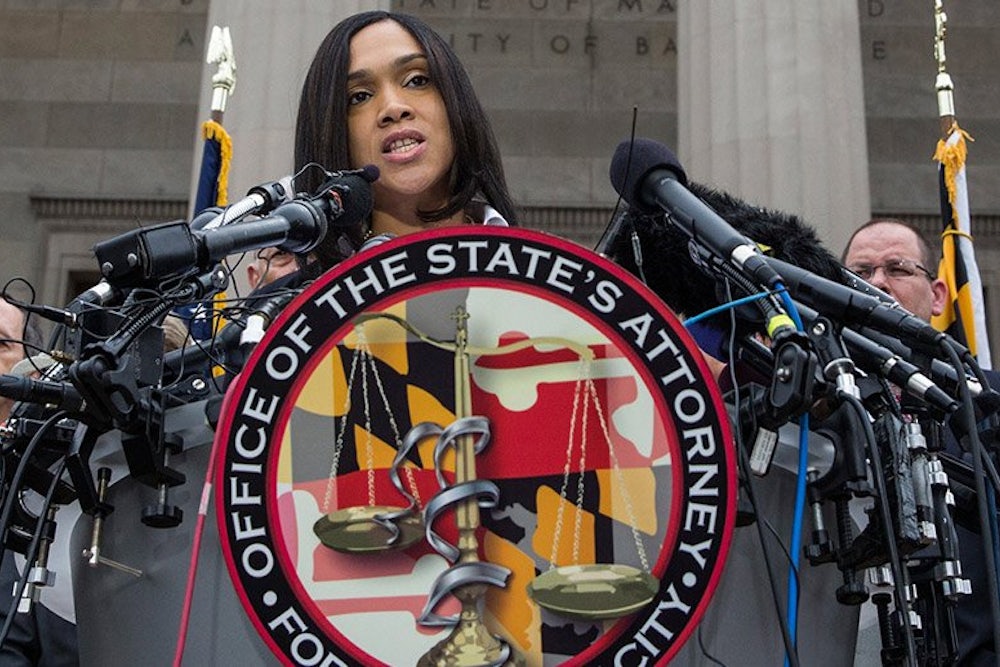The Baltimore Police Department sent the results of their investigation into Freddie Gray’s arrest and death to Maryland State Attorney Marilyn Mosby on Thursday, but, ironically, there were cops who didn’t want her on the case. Right as Mosby—who will serve as prosecutor in the Gray case—was announcing this morning the litany of charges against all six of the Baltimore police officers involved in Gray’s arrest and homicide on April 12, Lodge 3 of the Fraternal Order of Police (FOP) tweeted an open letter that asked Mosby to recuse herself because of her “many conflicts of interest.”
An Open Letter to State's Attorney Marilyn Mosby 5/1/2015 pic.twitter.com/iUJ7elR3bq
—
fop3
The Baltimore Sun reported that Mosby received a political donation from the Gray family attorney last year, for instance. Despite claiming to “have full faith in [her] professional integrity,” the letter even cited Mosby’s marriage to a city councilman, questioning her ability to do her job properly with his political future on the line.
It’s safe to assume that a $5,000 donation from a fellow lawyer and a husband in the city council aren’t the FOP’s real concerns about Mosby. (Mosby herself comes from five generations of police officers, including both of her parents, and has a profound respect for the police: “I know that the majority of police officers are really hard-working officers who are risking their lives day in and day out,” she told Baltimore magazine in January.) No, it seems more likely that the FOP was scared that Mosby was the antithesis to Bob McCulloch, the St. Louis County prosecutor who bumbled away an indictment in the Michael Brown case last year. They were scared she might actually do something.
What happened this morning is rare. According to new research reported on by Talking Points Memo last August:
There were 31 arrests of non-federal sworn law enforcement officers for a murder or non-negligent homicide committed with a firearm while on duty from 2005 to 2011. That would equal a little more than four per year…
Over the same period, according to the FBI, the number of justifiable homicides committed by law enforcement officers with a firearm was 2,706, or about 385 per year.
In this case, there was only footage of Gray’s arrest and nothing from inside the van, where he suffered a nearly complete severing of his spine and crushing of his voice box. Someone in the Baltimore Police Department even leaked a document to the Washington Post Wednesday with some faulty testimony that would have had us believe Gray caused those injuries himself.
Though accountability is scarce, cases like Freddie Gray’s are not. “Rough rides”—in which suspects lie facedown, in handcuffs, in the back of a police van—are part of an epidemic of police abuse that are not as frequently mentioned as, say, beatings at traffic stops or killings in broad daylight. This morning, Mosby finally shed some light upon the “rough ride” Gray was given in the police car. (It’s worth remembering here that this began when Gray made eye contact with a cop and ran, neither of which are illegal. The switchblade he was carrying, Mosby said, was legal and wasn’t even known to the police until after his arrest.) This information, just like the future prosecutions, is an important element in the accountability that she represents.
Too often we look at the culture of American policing and seek to address its root causes. We theorize about getting police to better “understand” the communities they police, and we get lost in discussions about cops shaking hands and learning the names of the black kids in their precincts. We get sidetracked trying to prove how human we are to those who so often dehumanize us, when the first priority is to get them to stop killing us. We say “stop killing us” in so many ways in oratory, with marches, or even sometimes with a brick or bottle. We know they hear us, but given that they have this level of job security, what real motivation does the police have to act?
What matters is when people like Mosby listen and prosecute offenders when they commit illegal acts. The most effective way to get cops who abuse to stop making illegal arrests and to stop abusing and killing us, I’d argue, is to make them truly scared of the possibility of not being cops anymore.
Baltimore’s police commissioner, Anthony Batts, has said that he wants the power to fire cops in his own department, but he doesn’t have it thanks to state law that precludes such action, even when an officer is charged with a felony. In October, he made noises about this when he released a report card on accountability, telling WBAL, “I could have fired people in 15 to 30 days if they were found guilty of egregious acts, [but] the law doesn't allow [for that here].” In a February interview, he was more diplomatic and touted progress being made toward greater openness and public access to police information—but even he now must see that transparency cannot be confused with accountability.
Mosby clearly agrees, addressing this directly when she took questions about the FOP’s letter at her Friday press conference. “I can tell you that the people of Baltimore City elected me and there is no accountability with a special prosecutor,” she said, forcefully. Later, when asked directly what needs to happen so that there are no more Freddie Grays, she answered, “Accountability.” How are we going to get that? asked the reporter.
“You’re getting it today,” Mosby replied.
